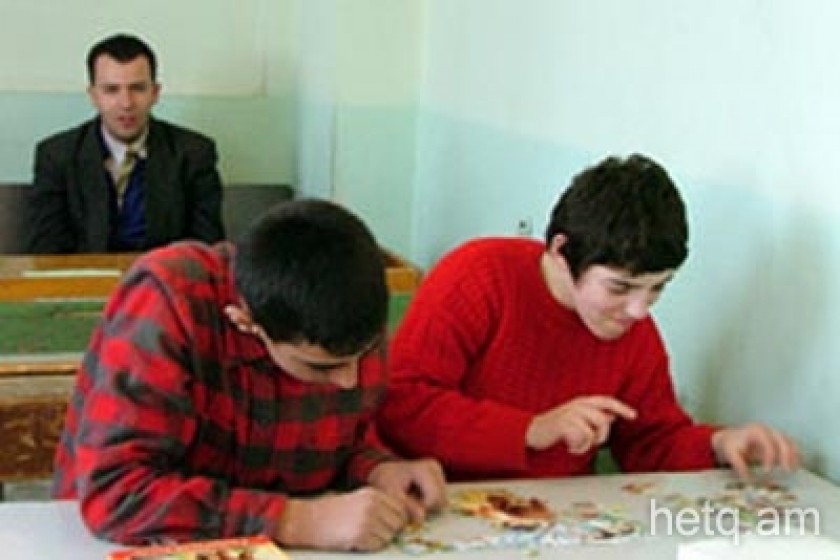
Different, But Not Alien
Once, the children in an elementary class of a Yerevan school asked their teacher why their classmate Narek was different. “We are all alike, we understand each other quite well, except for him,” they said. After pondering the question for a while, the teacher said, “Children, Narek doesn't understand you because he is Chinese.” Narek was not really Chinese. He was an Armenian child who had a mental disability. As part of a program to integrate healthy and disabled children, he had been placed in a school with “normal” children younger than him but with greater mental capabilities. Narek, who did not even know the alphabet, would tire of sitting with third graders during a mathematics class, for instance. He would not listen to the teachers and would disturb the children. But now they had found out the reason – Narek was Chinese.
Each individual tries to hide his or her faults. Similarly, society, which consists of a multitude of individuals, tries to hide its “faults” – people like Narek – by not talking about them or simply ignoring them.
At an intersection in central Yerevan, one can often see a young man walking with great difficulty from one car to another as he begs for money. He is mentally retarded. People look at him with dread as if he were something unknown or unpleasant.
Many turn their heads away in disgust. Nine out of ten people surveyed were convinced that such children are born to alcoholics, tobacco addicts, or immoral families.
It bothers some “perfect” people, because his imperfection causes pangs of guilt and inexplicable feelings of pity.
Many throw a quick glance his way and then quicken their pace. Folk wisdom suggests that one should not pity such people for fear of “tempting fate” to cause one a similar end.
“That madman again,” some people laugh.
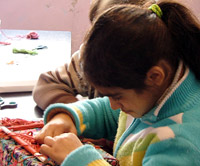 |
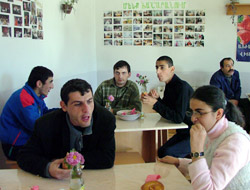 |
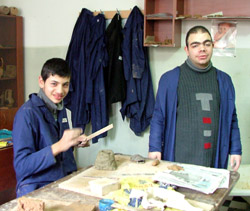 |
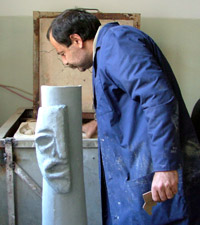 |
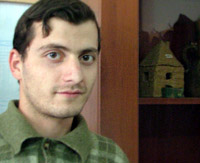 |
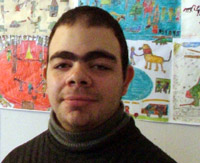 |
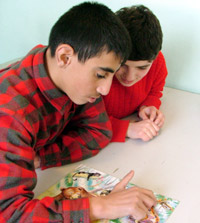 |
Mental disability is a disease which can be defined in simple words as follows – an individual's intellectual age and physiological age do not match. It has nothing to do with insanity.
In Armenia, mental retardation is still divided into three main categories – debility, imbecility and idiocy. Debility is the mildest form. People with this diagnosis are capable of perceiving their surroundings and persistent work with them can yield significant results. Idiocy is the most severe form. Idiots lack the ability to perceive their surroundings. They are usually bedridden and need constant care. Imbecility is somewhere between the two forms [translator's note: t he classification used for mental retardation is the old Soviet one . T he current classification gives four forms called mild, moderate, severe and profound. ]
Over the past two weeks, I have been virtually living at the Prkutyun (Salvation) center for disabled children. This center differs from other non-government organizations (NGOs) in its "Diurnal Center of Life Organization" , or day center. The children who visit the center are mostly mildly or moderately disabled. Many of them suffer from infant cerebral palsy.
The building where the center is located is an inconspicuous old two-story “Soviet” structure. In the winter, it is warmer outside than within its grey walls. But the cold from the stone tiles is quickly thawed by the warm smiles of the children, nannies and teachers. Each time I enter this building it is with the expectation of slipping through to another world. A world so positive, that it would do every “normal” person good to come here once in a while for practical lessons.
There are different creative groups set up at the center. All the group leaders work without pay; some of them, those coming from further away, only have their transport costs reimbursed.
The pottery room is the warmest, thanks to the kiln used by the group. The room was buzzing with activity. Davit was making a church and everyone was helping him. They were making clay building blocks like bricks, polishing them and leaving them to dry. Narek's hands were trembling – it was hard for him to manage the hard piece of clay with which he was making blocks and his face reddened with the effort.
Pottery teacher Mr. Ashot had placed Gevorg near the wall and given him “conductor's batons” – two brushes – told him to manage the children's pace of work. Gevorg could not work with the rest – his mental abilities did not suffice.
“When I finish the church, I'll make something else and give it to you,” Davit said to me.
It took two weeks of interaction to persuade the children to stop calling me “Mr.”, as they refer to their teachers, but many could not give up using the Armenian plural for the second person, denoting formality or respect.
“All right,” I replied to Davit.
“Do you like flowers?”
“Very much.”
“In that case, I'll make you a flowerpot. But I'll plant something in it first and then gift it to you, all right?”
“I'll be waiting,” I said, smiling.
“You'll take care of it, won't you? You'll water it, right?”
“Of course.”
Everyone here has their own plant and each is responsible for its care.
Some time later he walked towards me, limping as always, with a worried look on his face.
“You know, there is still so much work to do on that church, I don't know when I'll finish it. So I might end up making your gift much later. But don't think that I've forgotten! I'll make it for sure.”
I promised to wait for as long as necessary.
Alik polished the blocks. He had a speech impediment. I was often forced to strain my ears in order to understand what he was saying. Alik would spend the day at the center and work at a mechanic's garage in the evenings.
The clay girl he had made and placed atop a chest of drawers was perfect. Alik was also talented in drawing. Of all his drawings, one caught my eye because of its military theme.
“I didn't do that one, that was Ghevond's work,” said Alik and, forgetting about his own pictures, he started showing me his friend's work.
The children are very united. They wait together for their parents to pick them up at the end of the day. Together they try to explain to people making fun of them on the street that the fact that they were different from others was no reason to taunt them.
Ashot talked constantly, polishing blocks during short breaks between words. He constantly fights for justice with a very marked feeling of his own personality.
“Don't listen to him,” whispered Alik, “He's a little disturbed.”
Mr. Ashot, the children's teacher, is from the Shengavit district, but he lives close to the center. He has been working with the children since September of this year, but gives one the impression that he has known them for a much longer time.
“Of course, we'd always known each other,” he laughed, “I was their wandering spirit; it's just that they didn't know that.”
Ashot does not care about the children's illnesses. He does not even know about their medical backgrounds. He is convinced that many of the children who come to the center are more talented than “normal” children and that if you worked with them, the results would exceed any possible expectations. Seeing the work done by his pupils, I have no reason to doubt it.
“They can open doors that we cannot, do you understand? All we need to do is find those doors and help open them.
“We say, for example, ‘I cannot work, I don't feel like it.' They never say anything like that. They always have the inspiration to work.”
Ashot is convinced that people's illnesses are the results of sins committed by each of us in the past and violations – willing or unwilling – of the sacred laws of nature.
There are only boys in the pottery group. Ashot believes that clay and women are two incompatible concepts. The girls work in knitting, needlework and miniature art on rice grains. They interact less with me, compared to the boys. They look at me bashfully with childlike smiles and stay silent.
Arevik and Abgar were painting pictures. I managed to establish contact with Arevik immediately. She had so much love and caring within her which she had never expressed that she wanted to share it with everyone.
We even managed to chat a little. That would have been impossible a few years ago. When Arevik first came here, she could not even talk in sign language. Now, one could understand her speech.
Abgar only talks in signs. I took a picture of them with my digital camera and he expressed his immense excitement when he saw himself on its screen.
Davit sat at the very end. He was always tidily dressed, spiffy and sporting a tie. People here call him a future Member of Parliament.
Vahagn behaved quite aggressively. He would sense immediately if he was not liked or if one kept away from him and would respond in kind.
Tehmine, an expert in congenital defects, works with each child at the center on an individual basis.
Tehmine said that Vahagn possessed an amazing musical ear. He loved to buy music recordings, even a number of copies of the same cassette. His favorite singer was Aram Asatryan. He would buy five cassettes of Asatryan, open one and listen to it endlessly, carrying the others around with him until he would finally tire. Luckily, the shop next to his house is staffed with understanding people who have agreed to exchange his cassettes regularly.
“Do mentally retarded children sense that they are different from others?” I asked Tehmine.
“They usually don't perceive their mental retardation. For example, they don't understand that they may have said something funny or amusing. Because many of them also have infant cerebral palsy, the children think that they are being laughed at because, for example, they limp (infant cerebral palsy primarily afflicts the limbs). There are a few children who are more perceptive. Ghevond, for example, is surprised that he is only just learning the alphabet at the same time as his 7-year old brother, even though he is 21 years old.”
It seemed that 13-year old Armen was another of those “perceptive” children. During one of our meetings, he told me that he had fallen in love with a girl named Mayin.
“Does she know that you love her?” I asked him.
“No.”
“Why not?”
“Because Tigran is in love with her too, but he's normal.”
He said that with a smile, without even a hint of malice or sorrow, as if it were something that was perfectly natural.
 Videos
Videos Photos
Photos
Write a comment